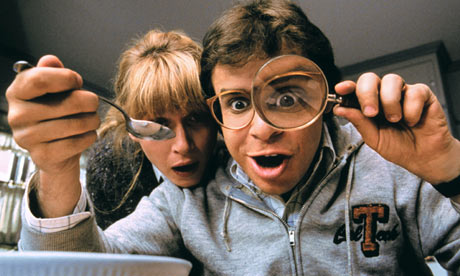
Is it true to say that progressively shrinking size is infinite? For example, is a trillionth the size of the nucleus of an atom actually possible?
Mathematically, yes, although a non-infinite universe may run out of space to write down all the zeros after the decimal point.
Practically, no; there are physical observational limits to the smallest distance we can measure, related to the wavelength of the radiation we observe with, which is proportional to the limits of the amounts of energy we (and indeed the "biggest emitters" of the universe such as quasars) have available to impart to particles. There's also Heisenberg's uncertainty principle in play, which means that the more precisely we know something's location, the less certainty we have about its other properties – ie the smaller we get, the less we know what the thing we're actually measuring is.
But there is also an absolute physical limit (well beyond those observational limits) called the Planck length, beyond which it is widely regarded (because it is derived from three fundamental constants of the universe, so we're pretty sure about this one) that no measurement or observation is possible. If you can't observe beyond that point, then to all practical purposes that is the smallest thing possible in the universe.
Does that mean even smaller, unobservable things are theoretically possible? Almost all fundamental theories such as special relativity, string theory and loop quantum gravity say not, and incorporate Planck's length as their absolute base unit, a sort of dpi (dots per inch) of the universe. However, the joker in the pack – extra dimensional theoretical physics – allows for different values of those fundamental constants, any value for Planck's length, and therefore no practical limit to the observable universe(s), given sufficient energies to do your observation with. For the moment, we haven't eliminated that possibility (and may never be able to).
James Zigrino, Edinburgh
Most European languages differentiate between familiar thou/tu and formal you/vous. When did English stop doing this and why?
English has not wholly lost its familiar form: a couple of years ago I worked with some contractors in Rochdale who all called each other "thee". It was still common enough in the early and mid-20th century for DH Lawrence to expect his readership to understand the significance of Walter Morel in Sons and Lovers addressing the young, middle-class woman he is about to start courting as "thee", and JRR Tolkien expected his to unpick the significance of the conversation between Eowyn and Aragorn, as he takes his leave of her to lead his troop to Minas Tirith, in which she addresses him as "thou" while he firmly sticks to "you". The abject spectacle that Eowyn is making of herself in this scene, and the slap that Aragorn is giving her, caused my very toes to crawl away with embarrassment.
Rachelthedigger
English has not quite stopped using thou/you. Many older Cumbrians use "thou" in informal conversation.
tawnyowl3
My (Yorkshire) parents used to assure me that in their schooldays it was insulting to use "thou" to one who was not either a sexual intimate or a much younger child. An appropriate fighting response, my mother claimed, might be: "Doan't thee 'thou' me: thee 'thou' tha'sen, an' see how tha laikes it!"
Andrew Coulson, Musselburgh, E Lothian
In my home city of Bristol, "thee" is regularly used, often in the form of "dee", so "are you going to …?" becomes "deest goin' to …?" This is best seen in the threat of a punch: "Diesel get a knuckle san'wich ..."
Andy Bebington, Croydon, Surrey
What causes someone to possess a "glass half empty" (negative) mentality, as opposed to a "glass half full" (positive) attitude?
Any negativist who cares if a glass is half empty or half full is a rank amateur. We truly negative people know that it doesn't matter, because someone is bound to knock it over and spill the lot shortly anyway.
Michael Fisher, West End, Queensland, Australia
Any answers?
Regarding the plight of polar bears with their ever-diminishing food supply, has anyone thought about relocating penguins from south to north? It seems ecologically a sound move.
Dr Stuart Jones, Skegness, Lincs
Why do Italian national sports teams mostly wear blue, rather than one of the colours represented on the flag?
James Forrester, Amstelveen, Netherlands
• Post questions and answers below or email them to nq@theguardian.com. Please include name, address and phone number.
Read more about the origins and aims of Notes & Queries

